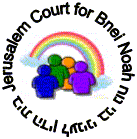Psak 5767 Tevet 6e
This statement is part of a series of twenty requests for piskei din (legal rulings) that have been submitted to the Beis Din by those who follow its rulings. While full piskei din (legal rulings) are in preparation, a brief summary is presented. The summary below is not meant to be used as a source for deriving any practical consequences. It will be replaced at a later date with a formal ruling.'
On the 6 Tevet, 5767 (27 December, 2006), the Beis Din for Bnei Noah was asked:

Jerusalem Court for Issues of Bnei Noah
Secretary: Rabbi Amnon Hever Tel: 054-9400909 b.d.hartzion@gmail.com
What is the meaning of the Noahide Oath?
Contents
What is the meaning of the Noahide Oath?
Question: What is the meaning of the Noahide Oath?
What is halachic implications of a Noahide pledge or oath before a Beis Din?
Answer. To achieve formal status, a non-Jew today has to make a declaration before a Beit Din of Jews. According to many authorities, there is value to the declaration of a person before a rabbinical court - beis din - that he or she accept and takes upon himself or herself the mitzvos of Bnei Noah. Therefore it is incumbent upon the beis din to accept such declarations from almost anyone who wants to make them.
The beis din facilitates declarations to allow Noahides to have a deeper and potentially more rewarding religious experience. This is according to the teaching that someone who observes a commandment after being obligated to do so is greater [perhaps: 'receives a greater reward'] than someone who voluntarily decides to keep a commandment whenever he or she fells like doing so.
The Noahide stands before the beis din and makes a declaration of intent. This is not an oath, and there is currently no way to enforce compliance by the beis din. This is the most minimal form of declaration that can be made. After making the declaration, the beis din gives out a certificates saying that such-and-such person made such a declaration. Nothing more is written on the certificate. The declaration expresses intent on the part of the applicant to uphold Noahide law. It does not imply in any way that the beis din agrees with the applicant's actions, understanding, or approach to Noahide law.
What about abuse of the Noahide Pledge?
Question: What about abuse of the Noahide Pledge
Recently, the beis din has heard objections on the part of Noahides concerning the potential abuse of the declaration by missionaries and those who might take the oath for ulterior motives. The suggestion was made to cross-examine applicants as the their beliefs.
Answer. The functions of a beis din does not include investigation. Evidence is to be brought to the court by the sides to a dispute, and related to by the court - very much like a court in the anglo-saxon tradition. The court does not investigate. It has no means of investigation.
The tradition is that a beis din hears claims, witnesses, reviews documents, issues decisions, presents documents to the sides in a case and a few other documents of the courts decision. In the classical case of convert a beis din makes the decision if to accept the convert after talking with the convert and being convinced in one or more face to face meetings that the convert is not lying. In the case of converts as a rule the strength of the motivation of the candidate is tried by refusing to convert him or her at the first request, although this is often waived if there is good reason to believe that the request to convert is Bona-Fide.
In an attempt to provide the most minimal bona-fide test of a applicant, it was decided by the court of Rabbi Schwartz in Jerusalem to include in the declaration which our beis din will require for a person with christian background, that "that person" is not and was not any part of a divinity, and was not a messiah.
This however is not a halachic statement concerning these beliefs. The beis din of Rabbi Schwartz in Jerusalem has issued no ruling on these issues.
What about those who hold "that person" is messiah?
Question: What about those who hold "that person" is messiah?
People who hold that he is not and was not any part of a divinity, but still holds that he was a messiah.
Answer: It is the opinion of Rabbi Schwartz that a person who believes that "that man" was a messiah is not transgressing any prohibition. However the issue is as follows: someone who believes that "that man" was a messiah seems to be only partly disassociating himself from full christianity, and there is a problem of what is meant by the term "messiah". Is the messiah a "divine messenger" to "save" the world. Now when I say "a divine messenger" I mean someone - otherwise normal human being - sent by "the divinity" as a messenger. It seems that some people mean "a person with divine attributes"!
An issue which could be seen as semantic becomes of major consequence.
The decision of Rabbi Schwartz is therefore that in the beis din over which he presides he will not accept declarations of people with christian background if they think that "that man" was a messiah. This DOES NOT MEAN that the declaration of such a person before any [other] beis din is valueless. Perhaps another beis din will be satisfied that the person before them is bona fide in acceptance of the totally non-divinity of "that man". They may accept the declaration, and it will be fully valid.
Click here to see the Hebrew version
References